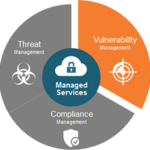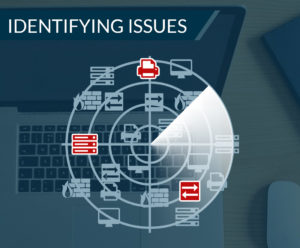How to Protect Against Denial of Service Attacks
There are many critical steps to keeping your network and applications safe, but how do you protect against denial of service attacks? If an outside party is flooding your email with spam, you won’t be able to receive new messages. If they are inundating your website with information and requests, it could slow your system to a crawl or even crash it. With your system is compromised, an attacker may even use your resources to attack another business. The real question is, what can you do to prevent this sort of attack?
Understanding how your infrastructure and network are set up is crucial. Make sure that your IT staff knows the ins and the outs of the hardware and software so that they can not only make it as secure as possible, but so they can also pinpoint what portion is being attacked. Keep documentation about the system setup and any changes made to it, and be sure that this record is kept up-to-date. You should know that if your system is used to attack another business, you may be held legally responsible for the damage!
Tips for Denial of Service Preparedness
- Test yourself to see what your system can handle. Be sure to test your volume over the Internet and assess your systems locally. If you know what the network’s breaking point is by creating your own denial of service attack, you can better understand how to protect your company from a real one.
- Keep your spam filters up-to-date. That step seems very obvious, but if spam is rejected it can’t fill up your inbox.
- Make sure that you have the space to handle a dramatic increase in server volume. By knowing as well as testing your system capabilities and limits you can better assess them to see how far they can be pushed before they crash.
- In the event you are attacked, be sure to contact your local FBI field office. Denial of service attacks are against the law, and it’s important that you report an attack on your system. Not only will it help law enforcement investigate the crime, it will give them additional information to help prevent this sort of attack on your business and others in the future. It doesn’t matter if the attack was successful or not it’s against the law all the same.
Knowing how to protect your business against denial of service attacks is a critical portion of IT security. It will help protect your network and reputation, as well as help protect other businesses that may get caught in the crossfire. By using the steps above, you can help make your company less likely to be the victim of a successful attack.
Benefits of Network Vulnerability Management Program Development
 If finding your way through the maze of network security is wearing you out, it may be time to look at the benefits of network vulnerability management program development. Without a tested method to ensure that all of your safety options and needs are being updated and reassessed, things may slip though the cracks and leave your system open to attack.
If finding your way through the maze of network security is wearing you out, it may be time to look at the benefits of network vulnerability management program development. Without a tested method to ensure that all of your safety options and needs are being updated and reassessed, things may slip though the cracks and leave your system open to attack.
What is Network Vulnerability Management Program?
Network vulnerability management program is a fancy term for organizing your security needs and keeping tabs on them. You should make a comprehensive list of all of your security risks and reassess this list on a regular basis. If you make any changes to your software or hardware, update the list and review your security options. Having all of your security data in one place makes it easier to review, and it helps you to ensure that you aren’t leaving any gaps in your safety structure.
Things to Consider
Reviewing your vulnerabilities isn’t the only benefit of network vulnerability management program. Equally important to the review is identifying and eliminating the vulnerabilities your network faces. You should continually monitor your weaknesses, looking for new gaps while ensuring known ones remain closed. Once you have identified the vulnerabilities, they should be assigned to the appropriate employees, and steps should be taken to test the fixes to ensure that they are truly resolved.
Another key aspect of a network vulnerability management program is developing a disaster plan. No matter how thorough you are, there is still the chance that something or someone will get through. In this event, having a plan of action ready will help to minimize the damage to your business and data, and will help get your company up and running again in the shortest time possible. Every second you aren’t working and every bit of data lost is money down the drain. Not only are you losing money, you maybe losing the trust your clients and customers place in you, and that is even harder to regain.
Hiring an IT Consultant
If developing a network vulnerability management program still seems daunting, why not hire an IT consultant to do it for you? These consultants live and breathe network security, and have the skills and the training to make sure that the plan they help you implement is comprehensive and tailored to your needs. You can’t be too protective of your network, and by forming a plan with the help of a consultant you can make sure there is nothing you have overlooked.
The benefits of network vulnerability management program development are immense, but unless you go through the process, you won’t have the plan in place to protect your business. Keeping a list of your security needs, hardware, and software and reviewing it regularly is critical. Equally important is implementing a disaster plan and working with an IT consultant to make sure nothing has slipped through the cracks. This isn’t just any network, after all. This is your business, and it deserves to be protected.
Benefits of Information Security Monitoring
 Denial of service attacks are becoming increasingly common, making the benefits of information security monitoring that much more valuable. A denial of service attack is when an outside party tries to crash your network by bombarding it with information, and it’s important that a business is able to protect itself against this type of attack. information security monitoring provides a cost-effective and highly efficient means of doing this.
Denial of service attacks are becoming increasingly common, making the benefits of information security monitoring that much more valuable. A denial of service attack is when an outside party tries to crash your network by bombarding it with information, and it’s important that a business is able to protect itself against this type of attack. information security monitoring provides a cost-effective and highly efficient means of doing this.
What is an information security monitoring?
An information security monitoring consultant is someone trained to make sure that you will have access to your information and systems when you need it, and that the security features protecting this information are also running properly. This consultant specializes in preventing denial of service attacks and can be a valuable asset to your team. Unlike a full time employee, you don’t have to take responsibility for keeping a consultant trained. One of the major benefits of information security monitoring is that the consultants have tremendous experience, training, and perspective on how to protect your business, and they are equipped to handle it. It’s all they do, and they are dedicated to security issues.
What information security monitoring Consultants Do?
Not only are consultants highly specialized, but another benefit of information security monitoring is that it is very cost-effective. Think of the cost of hiring a permanent specialist for your company, keeping them trained, and paying them a full time salary and benefits. By hiring a consultant, you have access to someone only for the hours you need them, and this person is continually trained and getting new experience in avoiding denial of service attacks. If you’re looking for a way to protect your company while lowering costs, hiring a consultant is the best of both worlds.
information security monitoring can also potentially minimize your liability in the event of a lawsuit. If you are successfully attacked, the attacker may have access to your computers and network. In a distributed denial of service attack, this attacker uses your resources to attack yet another company. How well your systems were protected is part of the discussion in determining who is liable for the attack. Any attack is a crime, but if you do not properly secure your business, it could be held partially responsible!
When looking to beef up your security, the benefits of information security monitoring cannot be overstated. It’s a cost-effective way of having highly trained specialists tighten up your network, infrastructure, and practices. For minimal cost and time, you can have access to the best professionals and reap the benefits of their knowledge all while protecting the security of your company.
Information Security Team, tips for hiring the right way
 Hiring an information security team may seem daunting. After all, not only are these people going to be in your workplace and interacting with all of your employees, but they will have access to critical information and have control of your network. It’s important that you find reliable, well-trained individuals who have the experience and credentials you need, and who you can also trust with your security needs. Having experience, however, isn’t enough. There are critical levels of creativity and flexible thinking that are also important when you build the best security team.
Hiring an information security team may seem daunting. After all, not only are these people going to be in your workplace and interacting with all of your employees, but they will have access to critical information and have control of your network. It’s important that you find reliable, well-trained individuals who have the experience and credentials you need, and who you can also trust with your security needs. Having experience, however, isn’t enough. There are critical levels of creativity and flexible thinking that are also important when you build the best security team.
Decisions in Information Security Team Hiring
When hiring, decide how much experience and training you need for your team as a whole. You may not need to have every team member have extensive experience in each aspect of information security. You are building a team, after all, and having quick learners and creative thinkers who comprise a wealth of experience and knowledge is very important. While you don’t want to hire an information security team that doesn’t have the ability to do the job, of course, hiring self-starters who enjoy keeping up-to-date on new issues and who can work together and learn from each other is essential to creating a team.
The information security team you hire also needs to be composed of flexible thinkers. These people are experts on IT issues, but the choices they make will affect each employee in your company. They need to be able to think like end-users and put themselves in the shoes of each person in your organization who will be using the network and applications they are maintaining. If your other employees can’t be productive, it doesn’t matter how good your IT team is with security. Your team is a resource for your entire company, and flexible thinking is key to making this happen.
Another critical step that is often overlooked is to run a background check on any IT professional you plan to hire. Think about it these people will have tremendous access to critical information as well as your network and applications. Running a background check is a simple way to weed out potential employees who may not be a sound risk for your business. Anywhere from one-third to one-half of inside system attacks come from employees with criminal records. If only their backgrounds had been checked before they were hired!
Finding the Right Employees
Hiring an information security team isn’t just about the nuts and bolts of experience and training. It’s also about resourcefulness and creativity as well as how trustworthy your candidates are. If you remember these ideas when you are hiring IT professionals, you can ensure that you are getting not only competent people, but that they will integrate with your entire organization and complement each other as a team.
For a more streamlined approach, you can even consider using an IT staffing firm. Reputable companies will not only have access to the ideal candidates, but they will also perform all background and personality checks for you.
Anti-Virus Options for Businesses
 There are plenty of anti-virus options out there to meet your business needs, but how do you know which options are right for your company? Depending on the type of network traffic your business is generating, your security needs may be very different from other companies, so it is important to make sure that you are getting the coverage you need for the risks you face.
There are plenty of anti-virus options out there to meet your business needs, but how do you know which options are right for your company? Depending on the type of network traffic your business is generating, your security needs may be very different from other companies, so it is important to make sure that you are getting the coverage you need for the risks you face.
Anti-Virus Options when Considering your Business Needs
Different types of businesses have special needs and require different anti-virus options. It’s important to determine what the company’s most common needs are. Do you only transfer documents and use email with colleagues and partners to do business? If so, you will have very different needs than a company who does commerce online and communicates with a wide variety of unknown parties. By taking the time to thoroughly list what sort of attachments you send and what sort you receive, as well defining your presence on the Internet, you can help to narrow down they type of anti-virus options your business needs to stay safe.
Differentiating Anti-Virus Software Options
Most anti-virus software have free trials available, which makes choosing a system far less painful. Unless you actually test the software and have your employees try it out, how can you know if it meets your needs? If it is too clunky to use or slows your system down, your users may covertly disable it, leaving your network open to attack. By trying a few types of software you can stay covered while researching the anti-virus software that has the options you need for your individual business.
Are you still worried about navigating the many options and anti-virus offers out there? Another smart step would be to consult with a specialist. By briefly hiring an IT consultant, you can work with a person who specializes in network security for a fraction of the cost of hiring a full-time employee to handle your anti-virus options. The consultant has in-depth knowledge of the software on the market, and specializes in helping businesses work out what their needs are and how to best meet them. They can have your new system fine-tuned and installed in next to no time, and you won’t have to worry if there are any safety features you have forgotten.
Keeping Your IT Network Safe
Your company has different needs than any other business potentially even businesses in the same industry. As such, it’s important that you look closely at what your needs and uses are to ensure that you are covering all of your security bases while getting the most bang for your buck. Utilizing free trials to make sure you have a product that works for you and asking an IT consultant some key questions can help you find the software that best meets your company’s needs with a minimum of hassle.
Recovery Software – Online server protection
 A very important part of company security is the protection of their servers. From web servers to internal data bases, all those machines must somehow be protected starting with a good quality recovery software tool and solid internet security measures. Nowadays there are more and more online protection solutions that are discovered and put to use. Recovery software was a main method to secure data before introducing multitasking systems. After that, data recovery is a last process in server protection methodology, and online security measures became the first and main method of server protection. As there are many dangers, there are also many different means of server protection.
A very important part of company security is the protection of their servers. From web servers to internal data bases, all those machines must somehow be protected starting with a good quality recovery software tool and solid internet security measures. Nowadays there are more and more online protection solutions that are discovered and put to use. Recovery software was a main method to secure data before introducing multitasking systems. After that, data recovery is a last process in server protection methodology, and online security measures became the first and main method of server protection. As there are many dangers, there are also many different means of server protection.
The first method is online backup. It is essential to routinely make copies of your data because nowadays you never know when you will need to activate your recovery software. Automatic online backup systems ensure that recovered information will be the most recent and complete.
Another very important thing is virus protection. Malware, spyware, trojan horses all those malicious programs can only be stopped by some online security scanner. Even the best recovery software won’t do much when even your backup data is corrupted by a virus.
Another danger is a possibility of a hacker attack. Many above mentioned programs that can be disabled by virus/spyware protection software have another target than simply corruption of your data. Sometimes they are used to gain control over the target machine, in order to gain access to a company’s network. Hacker attacks are one of the biggest threats to company security. The main target for the attacks is usually the confidential data of your employees or clients such as their credit card numbers, logins or passwords. However, sometimes the chosen target is also essential to your company financial and market well-being for example, hackers may try to steal or destroy confidential data about new contracts. They can even use your own recovery software to help them in thievery of your intellectual property.
Luckily for us, there exist many different means of online Internet security. There are many different information security solutions, from simple, software-based ones to more complicated hardware-based systems whose sole purpose is to block all unidentified connections to your servers. They also notice all movement in and out, creating security logs. Even if someone manages to gain access to your servers, his presence will be identified, and you will be able to respond to a possible threat.
Online protection systems can get unbelievably complex. The most important thing about it is that all of its parts are important. Without a solid recovery software tool even the best firewall won’t ensure safety of your company data and without data backup systems no anti-virus software can help you recover data lost during an HDD breakdown.
Network Security Specialist for Your Company and Using a Staffing Agency to Find One
 Security of your company’s information has always been essential. Nowadays even a small data leak may lead to a gigantic profit lost. It is even more important, at some stage of company development, its owners come to the conclusion that they need to contact some staffing agency and employ a network security specialist.
Security of your company’s information has always been essential. Nowadays even a small data leak may lead to a gigantic profit lost. It is even more important, at some stage of company development, its owners come to the conclusion that they need to contact some staffing agency and employ a network security specialist.
Using a staffing agency is a very comfortable way of finding personnel. A procedure to find the right network security specialists is the same as with other candidates as you designate your needs, the staffing agency checks its databases and will respond with a list of candidates. There are many different aspects of company security, and sometimes you need to recruit different specialists to cover them all. There is no use in asking a staffing agency about a network security specialist when you don’t know what you have to change. That’s why more and more companies decide to hire temporary network security specialists to check their security systems.
As with every other job, network security specialists might be employed temporary or on a long-term contract. There is almost no single staffing agency without offers of temporary jobs, so there is only the problem of offering the right contract to the right specialist.
When you hire a network security specialist to check your security measures, it is usually a good idea to contact a temporary staffing agency and hire a specialist on a short-term contract, or even on a commission. Such contracts end when progress of specialist work meets every condition. Of course, there has to be some special safeguards included in the contract we are talking about a person that will have access to all your company information. When the contract is finished and your company security is thoroughly checked, it is time to face some unpleasant facts about what you called company security. There is always something that needs improvement, and when you finally know what you need to change, it’s time to contact your staffing agency again.
This time thanks to what you’ve just done you know exactly what staff you need and your requirements can at last be clear. In this case it is also better to propose a longer-term contract. It is still a good idea to add additional conditions to contract in order to safeguard your company’s interest in case of a network security specialist quitting the job. It is also common to inform the staffing agency about those conditions; some people won’t sign loyalty papers and it would be a mistake to waste your time on interviewing them.
Vulnerability Scanner and the Benefits of using Them
 If you are looking for cost-effective methods to decrease the ways attackers can exploit security defects and get into your system, there are many benefits to a vulnerability scanner. A vulnerability scanner is a computer program that is designed to search your systems to find weaknesses and loopholes. You can then use this critical information to tighten security on your network and applications, thereby significantly reducing the risk of an attacker being able to break in.
If you are looking for cost-effective methods to decrease the ways attackers can exploit security defects and get into your system, there are many benefits to a vulnerability scanner. A vulnerability scanner is a computer program that is designed to search your systems to find weaknesses and loopholes. You can then use this critical information to tighten security on your network and applications, thereby significantly reducing the risk of an attacker being able to break in.
There are two basic reasons to use a vulnerability scanner. The first is to find your security weaknesses. The second is to find the weaknesses in other systems, since hostile programs can be used by attackers to find loopholes in your network and applications. This is why it is extra important that you are running your own vulnerability scans, because anyone trying to break in will likely have the same programs available.
Another benefit of a vulnerability scanner is that it can check your system for known defects to make sure they are patched correctly. It’s all well and good to be up-to-date on your security updates and patches, but having a program that can double check that they are all complete is even more valuable. It can save you resources in both employee time as well as lowering the chance that your company will have to recover from an attacker exploiting a security weakness.
Why to Choose a Vulnerability Scanner Program
Scanning your system is very cost-effective. For the price of the program, you can have your system mapped out and weaknesses found as well as have solutions offered to plug the holes. For more intensive protection, you may need to hire an IT consultant or have an IT staff member on hand to set up and maintain the scanning program for you. Oftentimes, they are able to focus on programs built to be regularly updated, enabling you to be sure that each time you run the program it has the most recent data on possible threats and how to block them. The programs can also be set to regularly scan your network so that you don’t even have to remember to set it in motion.
While there are many benefits to using a vulnerability scanner, it should just be one weapon in your arsenal. Using your scan in conjunction with a consultation by experts who can review the results is also an important step. The program can give you some great ideas about how to tighten up your loopholes, but in the end, it’s just a program. Having an expert you can call to help you interpret the results and implement a broader plan of action will help keep your network as secure as possible with minimal effect on your bottom line.
Capacity Planning as a Preventative Measure
 Keeping your business running smoothly is very important, and using capacity planning as a preventative measure is one method of doing this. Not only can you save yourself resources by not overestimating your needs, but you can prevent breakdowns in your system as well as slow network times by making sure you have the right amount of infrastructure now for your business to prosper.
Keeping your business running smoothly is very important, and using capacity planning as a preventative measure is one method of doing this. Not only can you save yourself resources by not overestimating your needs, but you can prevent breakdowns in your system as well as slow network times by making sure you have the right amount of infrastructure now for your business to prosper.
Capacity planning is estimating the software, hardware, and bandwidth your business will need, as well as the traffic it will experience as the company grows. Since the primary goal of proper capacity planning is to save you resources and money, you want to make sure that your choices are cost-efficient. Does it make sense to purchase a large server that you may not grow into before it becomes obsolete? Do you have the necessary bandwidth to handle your operations during normal traffic levels, but also if there is a peak in demand? By planning ahead of time, you can make sure you get the equipment and services you need to grow before you need them and without overspending.
Consolidating data into a single repository may also be a smart choice. If you can move commonly used data from your primary server but keep it accessible on your network you can save space and speed up your system time. You can also invest in products that scale up as you grow. These products require a minimum of capital going in and can be enhanced gradually as your needs increase. Be sure that any equipment and software you do purchase, however, is supported by the manufacturers so that you can get assistance with them and updates for them when needed. It defeats the purpose of your capacity planning to have to repurchase software and equipment.
What is your IT professional-to-staff ratio? Many businesses find that hiring a consultant instead of keeping an in-house IT employee not only saves them money, but also allows them to access people trained in cutting-edge practices. Utilizing this resource can save you the cost of having a full-time staff member, plus the specialist will also be able to help you develop your capacity plan and implement it with minimal risk and cost to your business. This expertise can save you time and any additional efforts as your business grows; after all, your needs will have been well forecast and already met.
Using capacity planning as a means of preventing the loss of time and resources down the road is a smart move. Planning for future growth and needs will ensure that your company runs smoothly as it expands. With a minimum of risk and expense, you can be free to efficiently manage your business as a whole instead of dealing with critical capacity issues after they become a problem.
Anti-Virus Software and Going Beyond the Norm
 Anti-virus software is one important component of a safe network, but it’s not enough. It does a great job of finding known viruses and removing their threats, but there’s a huge gap in the protection anti-virus software offers if you don’t understand how it works. Your employees must also take measures to prevent viruses from hitting your system at all.
Anti-virus software is one important component of a safe network, but it’s not enough. It does a great job of finding known viruses and removing their threats, but there’s a huge gap in the protection anti-virus software offers if you don’t understand how it works. Your employees must also take measures to prevent viruses from hitting your system at all.
Suppose you open an email attachment and it contains a virus that has been floating through cyberspace for the past few weeks. Your anti-virus software will likely catch the virus and quarantine or delete it, protecting your system and your business. But what happens if it’s a new virus? If it’s so new that your software doesn’t identify it as a threat, it could wreak havoc across your system. Viruses can delete vital information, send information to outside parties, or even install Trojan horse programs to allow hackers access to your data and resources.
There are some simple practices you can implement to go beyond your anti-virus software. Even when it is regularly updated to obtain definition files.
With Anti-Virus Software the following steps are still important.
- The first step is to make sure you are regularly updating all of your other software. Viruses are specialized to exploit loopholes in your operating system and the other programs you run. Updates are provided for download when these loopholes are discovered, making it much harder for viruses to attack your network.
- Another method to decrease your vulnerability to viruses is to restrict employee access to the Internet. Some sites that are truly inappropriate for the workplace are the most likely to contain viruses, but sometimes mainstream sites an employee may visit on break could contain a virus. Depending on the level of protection you want, you can restrict all non-business related Internet use to reduce the risk of contagion.
- Yet another route viruses take to infect your system is when employees open attachments that are either unexpected or are from unknown sources. They should be trained to ask the sender if an attachment comes unannounced before it is opened to make sure that it is indeed legitimate. Even known attachments can still be scanned to make sure that there is no hidden infection.
No matter how vigilant your employees are, it is likely that a virus will make it into your network at some point. Your employees should be trained to immediately contact the System Administrator for help in minimizing the damage. They should also contact everyone in their email address book, as a virus is likely to replicate by sending itself back out via email. Even if your system is infected, you can help your business associates and colleagues keep safe.
Going beyond anti-virus software is a must to protect your network and your business. Just a small amount of maintenance and some smart training can really make a difference in your level of vulnerability to this threat.